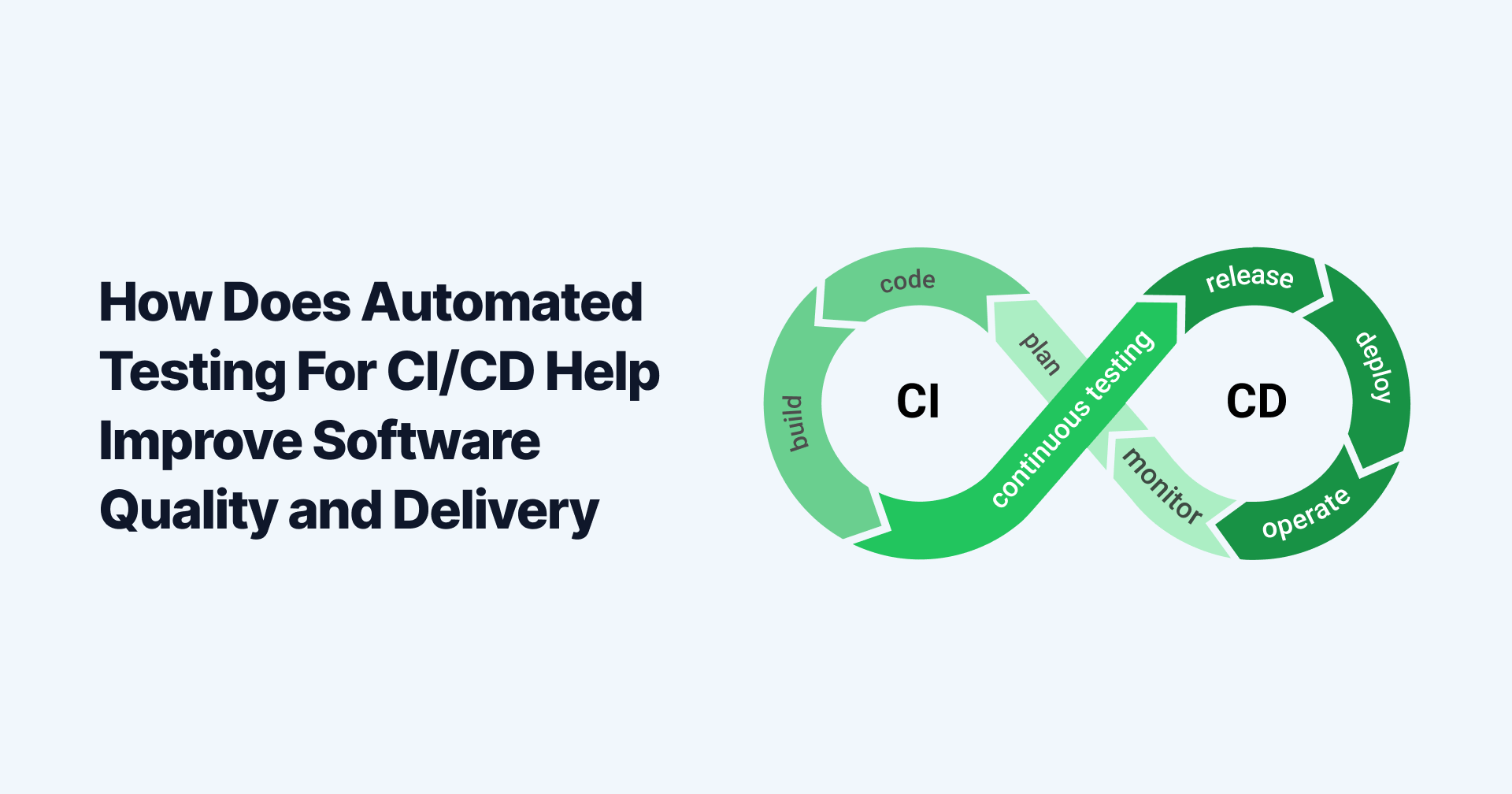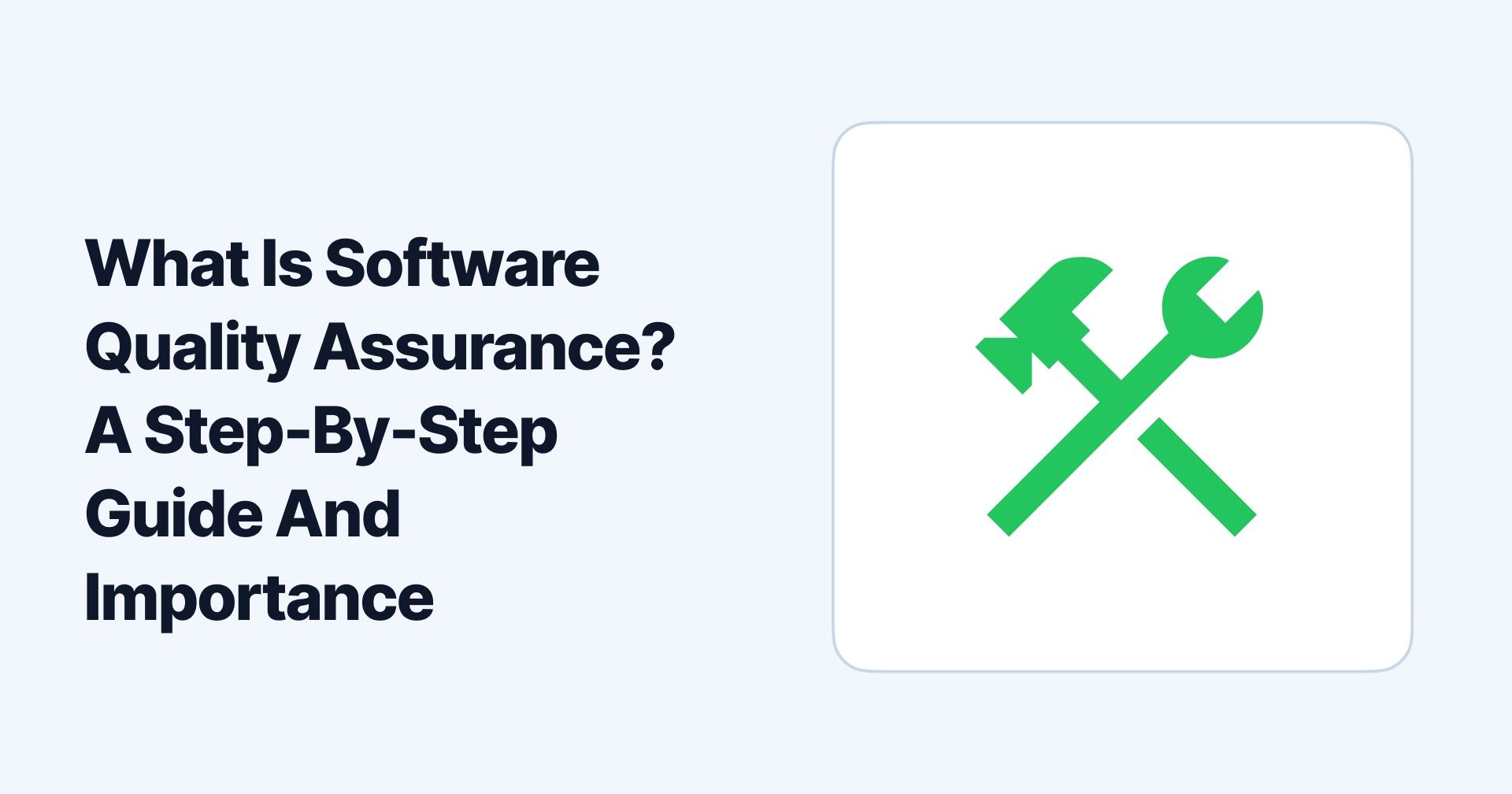
How Does Automated Testing For CI/CD Help Improve Software Quality and Delivery
Maggie Ferris
Mar 15 2023
Ensuring software quality is essential in today's cutthroat environment. Manual testing frequently falls short of expectations, consuming valuable time and resources and leaving room for human error.
As a result, faults and flaws find their way into the final product, resulting in customer unhappiness and costly rework. The need for a system to address these issues while accelerating software delivery is obvious.
Automated testing for CI/CD offers a game-changing solution to this. By automating the testing process, you can enhance overall product quality by accelerating feedback cycles and identifying and correcting defects and bugs early.
You acquire the ability to perform tests in parallel, on-demand, or on a scheduled basis with automated testing, allowing for faster discovery of faults and guaranteeing that your software meets the highest requirements.
This blog will explore CI/CD automation and how it helps improve software testing and delivery.
What are CI, CD, and Automated Testing?
Before understanding CI/CD automation, we must have a clear idea about CI/CD and automated testing.

Continuous Integration (CI)
Continuous Integration (CI) is a development practice aimed at increasing the efficiency and quality of software development. In CI, developers frequently integrate their code changes into a shared repository.
This procedure enables numerous developers to work on the same project simultaneously, guaranteeing that everyone's code is continuously incorporated into a centralized repository.
Benefits:
- Immediate feedback on code integration.
- Detect and address issues early on.
- Avoid the accumulation of conflicting changes.
- Accelerate development speed.
- Improve collaboration.
CD (Continuous Delivery/Continuous Deployment)
Now, let's talk about Continuous Delivery (CD) and Continuous Deployment, the powerhouses that take CI to the next level. Continuous Delivery focuses on automating the software release process, ensuring that your software changes are always in a deployable state.
It empowers you to deliver your software to production-like environments with ease consistently. With Continuous Deployment, you can take the automation even further by automatically deploying your software changes to production environments.
Benefits:
- Enable rapid and frequent software releases.
- Reduce the manual effort required for deployments.
- Ensure consistent and reliable software releases.
- Enable faster time-to-market for new features and enhancements.
- Improve overall agility and responsiveness to customer needs.
Automated Testing
Automated Testing involves using specialized tools and scripts to run tests, compare actual results with expected outcomes, and provide valuable insights into the quality of your software.
By automating your testing process, you can save time, increase efficiency, and enhance the overall quality of your code. With automated testing, you can create test scripts that simulate user interactions, validate system behavior, and catch any potential issues.
Benefits:
- Accelerate the testing process and reduce time-to-market.
- Increase test coverage and improves overall software quality.
- Enable faster regression testing after code changes.
- Reduce the dependency on manual testing and human error.
- Facilitate continuous feedback on the health of the software and prevent the introduction of critical defects.
While CI/CD pipelines and test automation are fool-proof tools for quality assurance, there still are limitations when it comes to software quality and delivery.
Challenges faced during Software Testing and Delivery
Let’s discuss some of the challenges faced during software testing and delivery that impact its quality significantly.
Ensuring sufficient test coverage
One challenge is to test all necessary functionality and scenarios thoroughly. To reduce the chance of unanticipated issues, rigorous planning and prioritization are required to cover a wide range of use cases, edge cases, and probable interactions.
Managing test environments
Setting up and maintaining test environments that closely mimic the production environment can be challenging.
The accuracy and reliability of testing findings can be influenced by ensuring consistent and reliable test environments with the relevant setups, dependencies, and data.
Handling continuous changes
Managing continual changes becomes difficult with agile development approaches and frequent program updates.
Coordinating testing activities across many teams, versions, and environments can be challenging while maintaining proper version control and synchronization.
Dealing with test data management
Getting and managing appropriate test data that covers multiple scenarios and accurately portrays real-world usage might be complex.
Concerns about sensitive data privacy and preserving data consistency across several testing phases complicate test data administration.
Balancing Time, Cost, and Quality
Striking a balance between delivering high-quality software on time and within budget is a common challenge.
Excellent planning, prioritization, and efficient testing resource utilization are required to ensure complete testing while meeting project timelines and resource constraints.
So how to overcome these limitations? CI/CD automation can help you avoid these challenges and improve your software quality significantly. Let us see what it is and how you can implement it.
What is CI/CD Automation?

Continuous Integration and Continuous Delivery automation, or CI/CD automation, refers to automating multiple software development, testing, and deployment steps to ensure a smooth and effective workflow.
It entails using tools, technologies, and practices to automate operations like code compilation, testing, artifact generation, and deployment, allowing faster and more reliable software change delivery.
Continuous integration guarantees that code changes are merged and validated frequently, allowing any integration issues to be identified early on.
Automated testing for CI/CD entails executing several sorts of tests, such as unit tests, integration tests, and acceptance tests, to ensure the software's functioning and quality.
Test automation provides faster feedback on code changes and aids in identifying and resolving defects or issues early in the development process.
A further significant aspect of CI/CD automation is continuous delivery. It entails automating the deployment process so software updates can be released frequently and consistently to diverse environments such as development, testing, and production.
How CI/CD Automation benefits you:
Automated Build and Integration
Automated testing for CI/CD helps you build and integrate code changes from multiple developers into a single repository. This eliminates manual effort, reduces errors, and ensures that all code changes are continuously integrated into a single, up-to-date codebase.
Automated Testing
Automating CI/CD pipelines automates various types of testing like unit, integration, and regression tests. This ensures that your application functions correctly, detects bugs or issues early in the development cycle, and provides faster feedback on the quality of your software.
Continuous Deployment
It also automates the deployment process, allowing you to automatically deploy your application to different environments, such as development, testing, and production. This eliminates manual deployment steps, reduces human error, and enables you to deliver new features and updates to your users more frequently and reliably.
Infrastructure as Code (IaC)
Defining your infrastructure and deployment environments through code allows you to version control your infrastructure, easily reproduce environments, and ensure consistency across deployments.
Release Management
It simplifies release management by automating versioning, tagging, and release processes. It allows you to track and manage different versions of your application, roll back changes if necessary, and ensure smooth and controlled deployments.
Now let us talk about the different types of tests you can run by automating testing in CI/CD.
Types of Automated Testing in CI/CD
- Unit Testing focuses on testing individual components or units of code to ensure they function correctly. Unit tests are typically written by developers and executed frequently to catch bugs and issues at an early stage.
- Integration Testing involves testing the interactions and integration between different components or modules of an application. It verifies that these components work together as expected and identifies any compatibility or communication issues.
- Functional Testing verifies whether the software meets the specified functional requirements. It involves testing the application's features, user interfaces, and workflows to ensure they perform as intended.
- Regression Testing ensures that changes or updates in the software do not introduce new issues or break existing functionality. It involves retesting previously tested features to validate their continued proper functioning.
- Performance Testing evaluates the software's responsiveness, stability, and scalability under various load conditions. It helps identify performance bottlenecks, such as slow response times or high resource utilization and ensures the application can handle the expected user load.
- Security Testing identifies vulnerabilities and weaknesses in the software's security mechanisms. It includes Testing for potential threats, such as unauthorized access, data breaches, or injection attacks, to ensure the application is secure.
- Smoke Testing is a quick and basic test to check if the critical functions of the software are working correctly after a new build or deployment. It helps identify significant issues early on before proceeding with further Testing.
But how to implement automated testing for CI/CD pipelines? Allow us to guide you through the process.
Implementing Automated Testing for CI/CD
Let us explore the key steps and considerations for implementing automated testing within your CI/CD pipeline.
Choosing the right testing tools and technologies
Choose automated testing tools and technologies suited to your CI/CD requirements. Consider your software's nature, programming language, framework, and platform compatibility.
To streamline the testing process efficiently, provide seamless connectivity with your CI/CD systems.
Defining a test strategy aligned with CI/CD objectives
Create a comprehensive test approach aligned adequately with your CI/CD goals. Clearly define the scope, levels, types, and metrics for your automated tests.
Assess the automation possibilities of each test based on characteristics such as return on investment (ROI), practicality, and ease of maintenance.
Developing reusable and maintainable test scripts
Create reusable, modular, and easy-to-maintain test scripts. Follow coding standards, conventions, and best practices in the sector.
Use descriptive names, comments, assertions, and logging to improve the readability and comprehension of your test scripts.
Integrating automated tests seamlessly into the CI/CD pipeline
Ensure that automated tests are seamlessly integrated into your CI/CD pipeline. Configure the tests to run automatically at specific points, such as after code pushes, before builds, or after deployments.
Utilize tools and technology that allow for the simple integration and execution of tests inside your CI/CD workflow.
Monitoring and leveraging test results for continuous improvement
Monitor and analyze test results to gain insights into your software's quality and performance. Use intuitive dashboards, charts, graphs, or notifications to visualize and efficiently convey your automated tests' progress.
Review and fix any issues or flaws discovered during testing to drive continuous improvement and improve software delivery.
You can significantly boost your testing process's productivity, accuracy, and coverage by embracing automation. Integrating a sophisticated test management platform like Allure TestOps can also improve your automated testing capabilities.
Allure TestOps is a comprehensive solution for managing and tracking manual and automated tests, integrating smoothly with your CI/CD tools. Let's see how-
Allure TestOps: Your Key to Automating Tests

Allure TestOps is an innovative test management software designed to automate and improve your CI/CD procedures. It acts as a centralized hub for handling manual and automated tests, increasing the efficiency of your team and offering valuable insights into your test coverage.
Allure TestOps assists you in integrating your automated tests into your CI/CD pipeline, providing speedy and dependable product delivery. Using Allure TestOps, you can easily import test results from numerous sources and integrate them with any CI platform.
This gives you total access to your testing process and allows you to track and report test failures. Through comprehensive reporting and dashboards, you may set goals, track KPIs, and track the progress of projects' testing.
Allure TestOps Features
Allure TestOps is a comprehensive test management platform enabling you to optimize your automated testing for CI/CD. Let's know more about its features-
Smart Test Cases

You no longer have to manually update your test cases after each test run with Smart Test Cases. Allure TestOps automatically refreshes your test documentation based on results tracking and analysis.
Smart Test Cases assist you in maintaining accurate and reliable test documentation across your CI/CD pipeline by reducing the laborious chore of upgrading test cases.
Integration with CI/CD Tools
Allure TestOps integrates seamlessly with common CI/CD tools and frameworks, ensuring smooth communication and automation throughout your development process.
It can integrate with tools such as Jenkins, Bamboo, GitLab, GitHub, CircleCI, TeamCity, and others, allowing you to incorporate automated testing seamlessly into your CI/CD workflow.
Defects and Issue Tracking

Allure TestOps includes comprehensive defect and problem-tracking tools. You can track and manage defects and issues uncovered during testing, ensuring they are handled and fixed immediately.
This allows you to keep track of the state of your project and provides for efficient cooperation among team members.
Advanced Test Analytics
Allure TestOps provides deep analytics and insights into your test data, allowing you to analyze trends, find patterns, and make data-driven decisions.
You may better understand your test results, uncover bottlenecks, and continuously improve your testing procedures with advanced visualization tools and configurable reports.
Powerful and Flexible Dashboards

Allure TestOps provides robust and adaptable dashboards that provide real-time visibility into your testing process.
You may design customized dashboards geared to your specific needs, allowing you to monitor key indicators, track progress, and get a complete picture of your test coverage and project status.
Allure TestOps provides a centralized solution for managing your tests, integrating with CI platforms, and gaining valuable insights into your test coverage.
Leveraging Allure TestOps, you can streamline your testing processes, improve software quality, and achieve faster and more reliable software delivery in your CI/CD pipeline.
Allure TestOps Pricing
We offer two plans- Cloud and Server. Pick your plan and try it for yourself without committing to anything; you don’t need a credit card to sign up for the free trial.
Cloud
- Hosted on Allure's infrastructure.
- $39/ month per user or fewer.
- Secure AWS hosting.
- 60 GB storage included.
- Monthly or annual billing.
- From 1 user.
- Get 14-day free trial.
Server
- Hosted in-house.
- $30/ month per user or fewer.
- Full control over your instance.
- Private services integration.
- Quarterly or annual billing.
- From 5 users.
- Get 30-day free trial.
Conclusion
You can revolutionize your software development process by including automated testing in your CI/CD pipeline. Automated testing for CI/CD has various benefits, including shorter feedback cycles, earlier fault detection, and higher overall product quality.
It enables you to run tests in parallel, on-demand, or on a schedule, allowing for efficient fault detection and adherence to the highest standards. Allure TestOps, as a comprehensive test management platform, connects with your CI/CD tools and simplifies your testing processes.
You can speed up your software development process, reduce errors, and improve customer happiness by embracing automated testing and leveraging the advanced features of Allure TestOps.
Step forward with Allure TestOps and unlock a new era of efficiency and reliability in your CI/CD pipeline.


